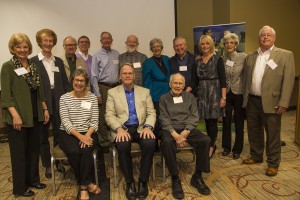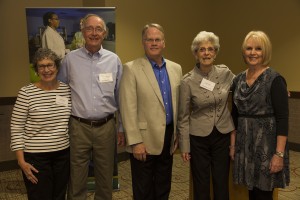It’s the people who make Colorado State University a special place to work and learn. Retired faculty and staff played a huge role in shaping CSU, and the current generation can connect with and learn from those who paved the way for them.
The Legacies Project out of CSU’s College of Health and Human Sciences shares and honors the legacies of its faculty emeriti and retirees. And the collection of stories of people who have shaped the college – in their own words — has started building an impressive legacy of its own.

When the Legacies Project took gold in two categories of the regional Council for Advancement and Support of Education (CASE) competition in January, it was impressive. After all, CSU was one of only two schools in Colorado to receive the recognition in the district, which encompasses eight states.
When the Legacies Project went on to the national CASE competition and picked up one of only seven Platinum Awards, it was elevated to a whole new level. It’s now recognized as a national model for “Best Practices in Fundraising.”
“The recognition by CASE validates the importance of building sustainable connections with our faculty emeriti and retired staff,” said Jeff McCubbin, dean of the College of Health and Human Sciences. “Our retirees created the foundation for our college, and we value them greatly.”
20 and growing
The Legacies Project, which highlights the personal and professional stories of CSU retirees and faculty emeriti, was created in 2011 as a way to strengthen bonds among them and to preserve the university’s history. Twenty retirees have been featured to date, and four new individuals are selected each year.
Honorees participate in video interviews that are posted on dedicated Legacies Web pages, accompanied by a biography, contact information, and a link to an online giving page associated with a scholarship or fund created in their name.
The Legacies Project was recognized for its “clever way to reconnect with and honor retired faculty and staff from the College of Health and Human Sciences.” The CASE judges were especially impressed with the replicability of the project, a sentiment shared by the honorees as well.
“The Legacies Project is very well designed for replication because it has carefully worked-out logistics and pays great attention to the interaction and support of its participants,” said Janet Fritz, a professor emerita in the Department of Human Development and Family Studies and 2012 Legacies Project honoree. “It is a terrific launching pad for other institutions to pick up — it’s several years of hard work and refinement sitting for them on a platter.”
The Legacies Project forges relationships and recognizes those who have made CSU a great institution. It also provides a tool for those whose lives have been touched by the honoree, or the honorees themselves, to continue their legacy through donations to an established CSU fund or scholarship.

Renewing bonds
Sometimes the retirees have not previously received recognition for their many years of service, while others may have lost their connection with the university. Their participation in the project often renews their bond to the college and CSU.
“Sometimes you feel like you don’t have a tie to the university and they’ve forgotten you exist,” said Tex Anderson, professor emeritus from the School of Education and 2012 Legacies Project honoree. “The Legacies Project helped me feel like a part of the college again.”
In addition to the CASE awards, Legacies has received additional national attention. The Board on Human Sciences invited Dean Jeff McCubbin and Victoria Keller, associate director of development, to deliver a presentation about the Legacies Project at the BoHS national conference in spring 2014 in Washington, D.C. The Legacies presentation is now featured on the BoHS website at http://thebohs.org/2014_bohs_conference.aspx.
As the Legacies Project continues to garner national attention, there will be some exciting changes to the website in the coming year in addition to the new 2016 honoree webpages. These changes aim to bring more voices and histories to the Legacies Project.
“Being part of the Legacies Project gave me the opportunity to discover my legacy as others saw it,” added Ellie Gilfoyle, 2013 Legacies Project honoree and former CSU provost/academic vice president. “Having others share in the project was validation of my work, and doing so has been a glorious gift to me.”
For more information about the Legacies Project, visit www.legacies.chhs.colostate.edu.